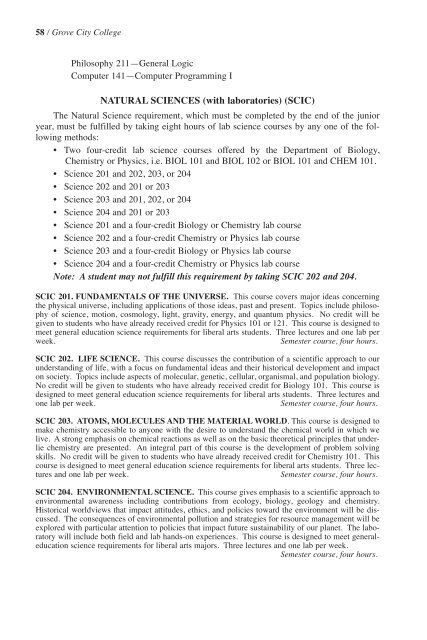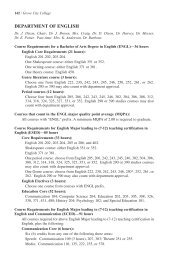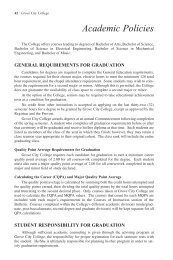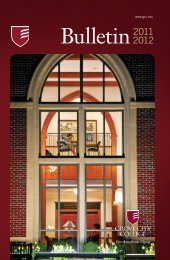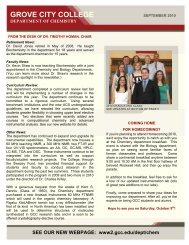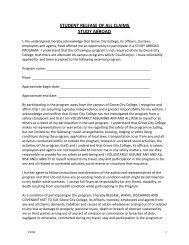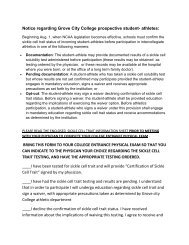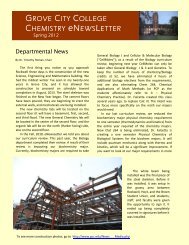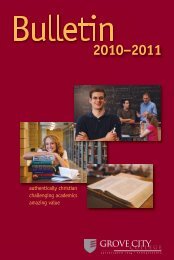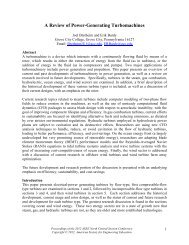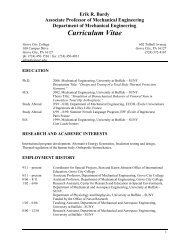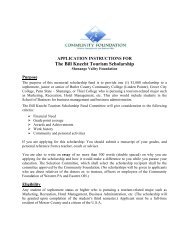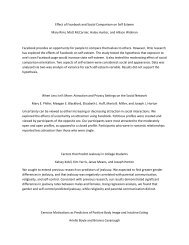2009–2010 - Grove City College
2009–2010 - Grove City College
2009–2010 - Grove City College
Create successful ePaper yourself
Turn your PDF publications into a flip-book with our unique Google optimized e-Paper software.
58 / <strong>Grove</strong> <strong>City</strong> <strong>College</strong><br />
Philosophy 211—General Logic<br />
Computer 141—Computer Programming I<br />
NATURAL SCIENCES (with laboratories) (SCIC)<br />
The Natural Science requirement, which must be completed by the end of the junior<br />
year, must be fulfilled by taking eight hours of lab science courses by any one of the following<br />
methods:<br />
• Two four-credit lab science courses offered by the Department of Biology,<br />
Chemistry or Physics, i.e. BIOL 101 and BIOL 102 or BIOL 101 and CHEM 101.<br />
• Science 201 and 202, 203, or 204<br />
• Science 202 and 201 or 203<br />
• Science 203 and 201, 202, or 204<br />
• Science 204 and 201 or 203<br />
• Science 201 and a four-credit Biology or Chemistry lab course<br />
• Science 202 and a four-credit Chemistry or Physics lab course<br />
• Science 203 and a four-credit Biology or Physics lab course<br />
• Science 204 and a four-credit Chemistry or Physics lab course<br />
Note: A student may not fulfill this requirement by taking SCIC 202 and 204.<br />
SCIC 201. FUNDAMENTALS OF THE UNIVERSE. This course covers major ideas concerning<br />
the physical universe, including applications of those ideas, past and present. Topics include philosophy<br />
of science, motion, cosmology, light, gravity, energy, and quantum physics. No credit will be<br />
given to students who have already received credit for Physics 101 or 121. This course is designed to<br />
meet general education science requirements for liberal arts students. Three lectures and one lab per<br />
week. Semester course, four hours.<br />
SCIC 202. LIFE SCIENCE. This course discusses the contribution of a scientific approach to our<br />
understanding of life, with a focus on fundamental ideas and their historical development and impact<br />
on society. Topics include aspects of molecular, genetic, cellular, organismal, and population biology.<br />
No credit will be given to students who have already received credit for Biology 101. This course is<br />
designed to meet general education science requirements for liberal arts students. Three lectures and<br />
one lab per week. Semester course, four hours.<br />
SCIC 203. ATOMS, MOLECULES AND THE MATERIAL WORLD. This course is designed to<br />
make chemistry accessible to anyone with the desire to understand the chemical world in which we<br />
live. A strong emphasis on chemical reactions as well as on the basic theoretical principles that underlie<br />
chemistry are presented. An integral part of this course is the development of problem solving<br />
skills. No credit will be given to students who have already received credit for Chemistry 101. This<br />
course is designed to meet general education science requirements for liberal arts students. Three lectures<br />
and one lab per week. Semester course, four hours.<br />
SCIC 204. ENVIRONMENTAL SCIENCE. This course gives emphasis to a scientific approach to<br />
environmental awareness including contributions from ecology, biology, geology and chemistry.<br />
Historical worldviews that impact attitudes, ethics, and policies toward the environment will be discussed.<br />
The consequences of environmental pollution and strategies for resource management will be<br />
explored with particular attention to policies that impact future sustainability of our planet. The laboratory<br />
will include both field and lab hands-on experiences. This course is designed to meet generaleducation<br />
science requirements for liberal arts majors. Three lectures and one lab per week.<br />
Semester course, four hours.


